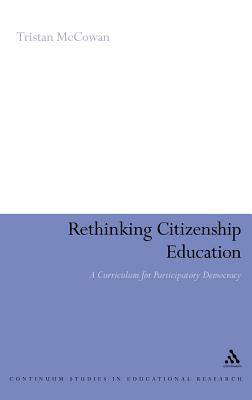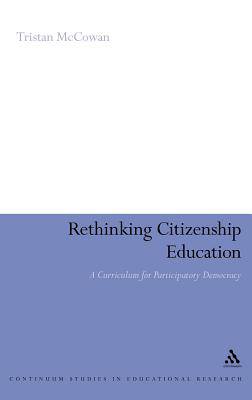
- Retrait gratuit dans votre magasin Club
- 7.000.000 titres dans notre catalogue
- Payer en toute sécurité
- Toujours un magasin près de chez vous
- Retrait gratuit dans votre magasin Club
- 7.000.0000 titres dans notre catalogue
- Payer en toute sécurité
- Toujours un magasin près de chez vous
339,45 €
+ 678 points
Format
Description
Rethinking Citizenship Education presents a fundamental reassessment of the field. Drawing on empirical research, the book argues that attempting to transmit preconceived notions of citizenship through schools is both unviable and undesirable. The notion of 'curricular transposition' is introduced, a framework for understanding the changes undergone in the passage between the ideals of citizenship, the curricular programmes designed to achieve them, their implementation in practice and the effects on students. The 'leaps' between these different stages make the project of forming students in a mould of predefined citizenship highly problematic. Case studies are presented of contrasting initiatives in Brazil, a country with high levels of political marginalisation, but also significant experiences of participatory democracy. These studies indicate that effective citizenship education depends on a harmonisation or 'seamless enactment' of the stages outlined above. In contrast, provision in countries such as the UK and USA is characterised by disjunctures, showing insufficient involvement of teachers in programme design, and a lack of space for the construction of students' own political understandings. Some more promising directions for citizenship education are proposed, therefore, ones which acknowledge the significance of pedagogical relations and school democratisation, and allow students to develop as political agents in their own right. "Continuum Studies in Educational Research (CSER)" is a major new series in the field of educational research. Written by experts and scholars for experts and scholars, this ground-breaking series focuses on research in the areas of comparative education, history, lifelong learning, philosophy, policy, post-compulsory education, psychology and sociology. Based on cutting edge research and written with lucidity and passion, the "CSER" series showcases only those books that really matter in education - studies that are major, that will be remembered for having made a difference.
Spécifications
Parties prenantes
- Auteur(s) :
- Editeur:
Contenu
- Nombre de pages :
- 232
- Langue:
- Anglais
- Collection :
Caractéristiques
- EAN:
- 9781847060587
- Date de parution :
- 27-05-09
- Format:
- Livre relié
- Format numérique:
- Genaaid
- Dimensions :
- 157 mm x 234 mm
- Poids :
- 521 g

Les avis
Nous publions uniquement les avis qui respectent les conditions requises. Consultez nos conditions pour les avis.






